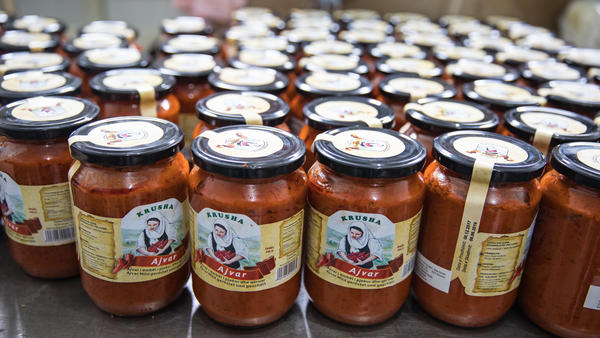Re-claiming Life After War: Women of Krusha e Madhe
- Utopia 500

- Oct 13, 2021
- 3 min read
A rarely seen before level of bravery and resilience is what depicts the story of this article. A story of heart-wrenching pain turned into strength. Pain detaches, but sometimes, pain unites. That’s what it did for the widowed women of Krusha e Madhe – a village which in 1999, endured one of the most gruesome war massacres in Kosovo from the Yugoslav army. The women of this village were displaced with their children and forced to flee to the Albanian border – leaving behind all their men. The Serbian army ordered all the men of the village to line up – aged from 14 to 73, as they burned their houses to the roots. Afterwards, they were all killed. Upon the women’s return, they were faced with the shattering reality that they could either accept their fate and live in poverty, or pick up the pieces and rebuild their village, their businesses, and their entire lives.

Credits: WikimediaCommons
Initially, the women established an organization called Widowed Women (Grate e Veja) with the aim of finding the missing people in their region – but as a result of the lack of support it slowly and eventually turned into an agricultural cooperation called “Krusha”. That being the aftermath of becoming the head providers of their families through farming and planting soil. One of their main specialties they turned into canned goods is Ajvar, a relish made from sweet bell peppers and eggplants.
Credits: Valeria Plesch; KosovaLive
Fahrije Hoti, who came up with this idea, is the woman leading the cooperative. When asked about her tragic history and motivation to rise, she shared that the work had mended her psychologically.

Fahrije notes: “I healed myself through work. After experiencing my toddler being taken away from my own hands and not knowing where my husband is for 22 years now – work and community is what saved me."
Fahjrija was trying to rebuild her life with any remaining force. But she recalls that in the beginning, when she started the business, it was extremely difficult for her to break the prejudices of her village. Prejudices about widows have brought them various problems, as they weren’t expected to focus on work, personal and collective success, and to oppose arranged marriages.
The initiative started with five village women who produce some jars of ajvar and pickles and decide to sell at the nearest shops. The demand for their product was constantly rising and the number of women who joined the team was increasing likewise. In 2010 the start-up organization of Fahrija and other women was registered as a cooperative, now known as "Krusha". In 2014, the number of employees reached 55 people. The Krusha Cooperative has expanded beyond the retail market and now exports up to 8000 jars for one order to Germany or Switzerland.
German Ambassador Christian Heldt promoting Krusha's Ajvar in Germany.
In 2021, they expect that their cooperative will be moving into their new factory building, where their work will continue. Over 70 employed farmers coming from the suburbs of Rahovec collect peppers during August and September, while in November the red pepper is imported from Albania. Tomatoes are obtained from the region of Peja and Istog; from the hands of the farmers, the peppers pass to the 20 women of the cooperative.
When they are in good spirits, conversations and spontaneous traditional dancing prolong their working hours and even production. Fahrije does not reveal her ajvar recipe, but we can guess that the desire for hard work, merged with bitter memories, as well as the will for work, gives their ajvar the perfect balance of bittersweetness.

Amongst the many people inspired by Fahrije’s story is film director Blerta Basholli who recently created a movie on this story, named Hive. It was launched this year and became the first film in Sundance history to win all three main awards – the Grand Jury Prize, the Audience Award, and the Directing Award. Credits: AlbInfo
We are looking forward to having access to streaming services for the movie – but in the meantime, enjoy the trailer:
Written by Aurora Hyseni




















Comments